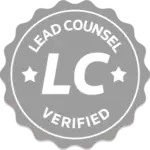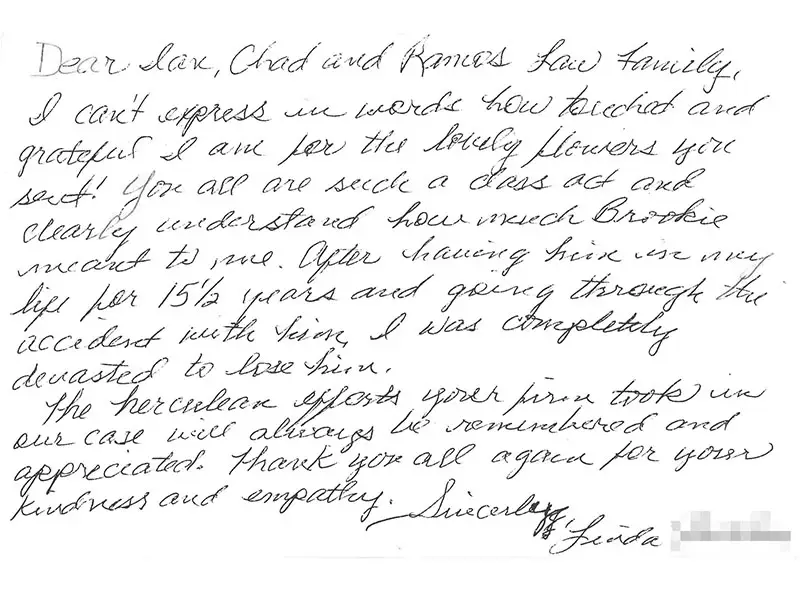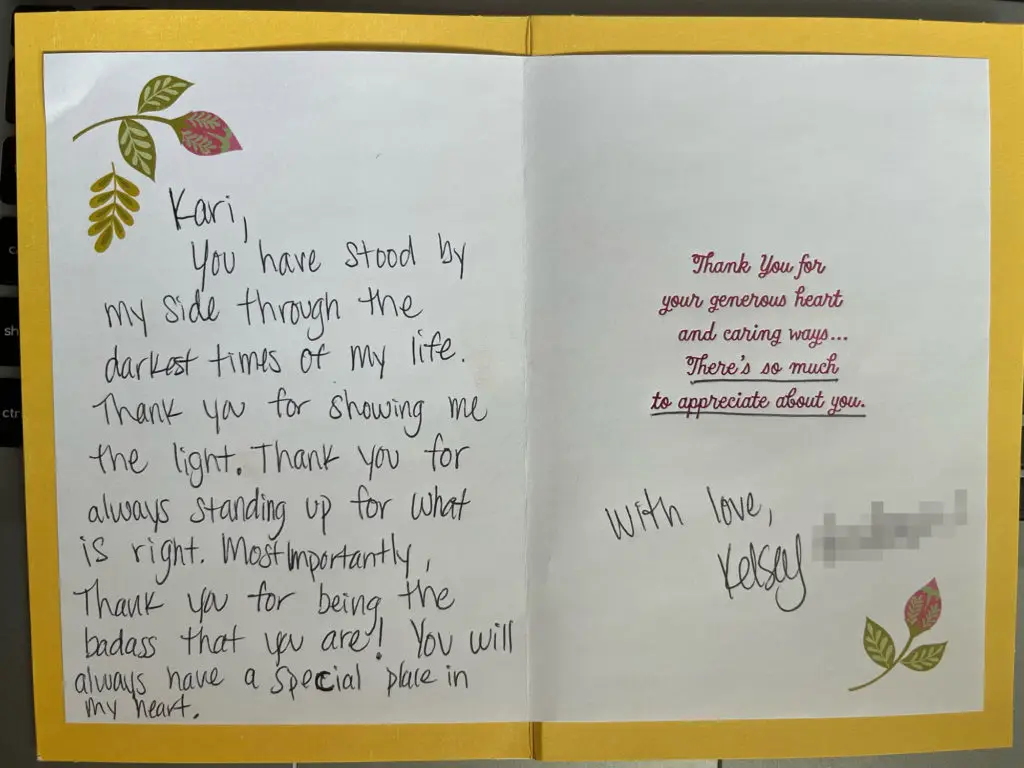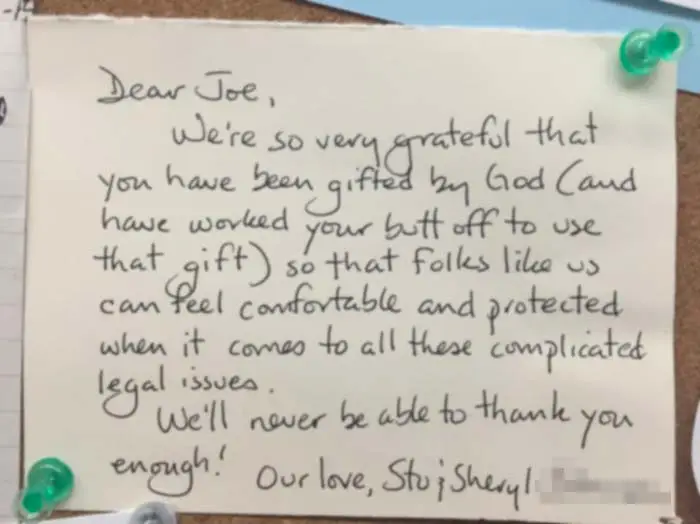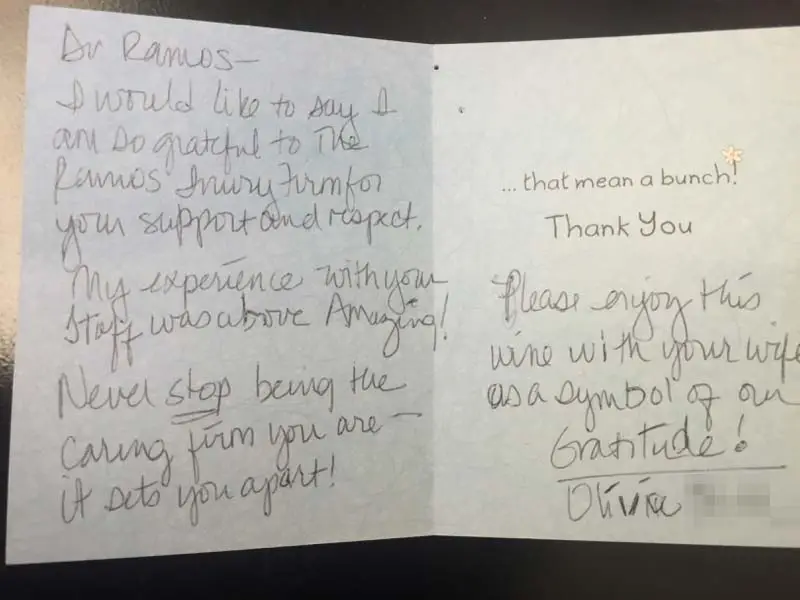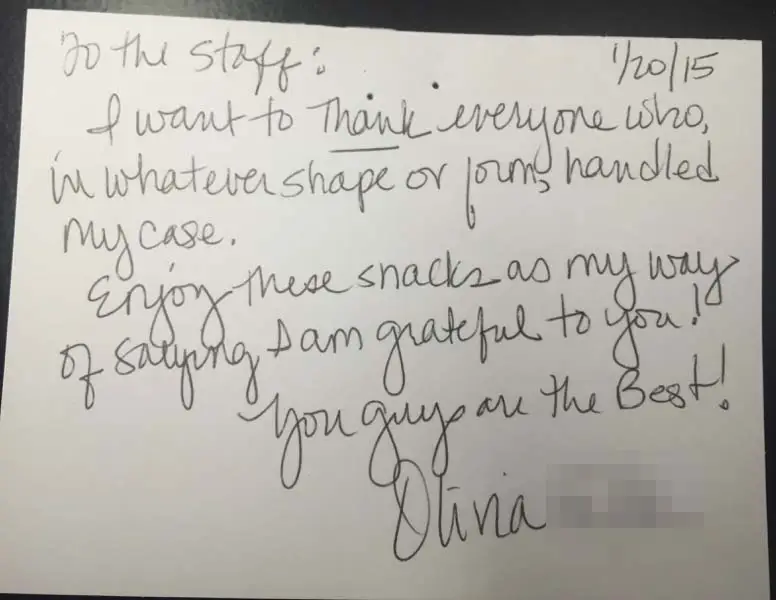Denver, Colorado Slip and Fall Lawyers
Talk With Us TodayDenver
(303) 214-7927Address: 1512 Larimer St Ste 600, Denver, CO 80202 Call Any Time – 24/7
Denver Slip & Fall Accident Attorneys
A sudden slip and fall can leave you facing painful injuries, mounting medical bills, and uncertainty about your next steps.If a property owner’s negligence led to your fall, you shouldn’t have to bear the burden alone.
At Ramos Law, we hold negligent businesses and property owners accountable. Insurance companies may try to downplay your injuries or shift the blame, but we know the tactics they use—and we won’t back down. With a deep understanding of both legal and medical complexities, our team fights for the compensation you need to recover and move forward.
In addition to slip and fall cases, our firm provides legal representation for a variety of personal injury claims, including:
Tell Us About Your Case
Doctor + Lawyer: legal Support Backed by Medical Insight
At Ramos Law, we bring something unique to the table: an unparalleled combination of legal skill and medical expertise. Founded by Dr. Joseph Ramos, an attorney and emergency room doctor, we understand not only the legal complexities of slip and fall cases but also the real, lasting impact of your injuries. Our dual perspective lets us build stronger, more compelling cases that truly reflect what you’ve been through and what you’ll need to recover.
Slip and fall cases may seem straightforward, but proving negligence and securing fair compensation takes experience, strategy, and a deep understanding of both injury law and medical science. That’s where we excel.
Why Ramos Law is Different
- Medical Knowledge on Your Side: Dr. Ramos’s experience as both a doctor and lawyer helps us fully understand your injuries and long-term needs.
- Detailed Case Investigation: We gather evidence, consult experts, and build a strong case to prove negligence.
- Customized Legal Strategy: Every case is unique, and we tailor our approach to fight for the best outcome.
- Full Compensation Pursuit: We seek maximum recovery for medical costs, lost wages, pain, suffering, and future care.
With Ramos Law, you’re not just another case. Our team truly understands your injuries and is committed to getting you the justice and compensation you deserve.
Slip and Fall Premises Liability Lawyers
Slip and fall accidents often fall under the broader category of premises liability law, which holds property owners and managers legally responsible for maintaining safe conditions on their premises. In Colorado, the law considers your legal status on the property, whether you’re an invitee, licensee, or trespasser, when determining the level of care owed to you. If you were injured due to a hazardous condition like wet floors, icy sidewalks, or poor lighting, and the property owner knew (or should have known) about the danger and failed to fix it, you may have a strong claim. Our Denver slip and fall attorneys understand the local laws and work aggressively to hold negligent parties accountable while seeking full compensation for your injuries.
Common causes of slip and fall accidents include:
Wet or slippery floors with no warning signs
Uneven sidewalks or cracked pavement
Icy or snow-covered walkways not properly cleared
Loose rugs or floor mats
Poor lighting in stairwells or hallways
Unmarked changes in elevation
Broken or missing handrails
Cluttered walkways in stores or commercial spaces
Slip & Fall Educational Resources
Knowledge is key when dealing with a slip and fall injury. Our video resources provide valuable insights to help you understand your rights, navigate the legal process, and make informed decisions about your case.
Tell Us About Your Case
We know a slip-and-fall accident can turn your life upside down. These heartfelt words from our past clients speak to the dedication, compassion, and results we bring to every case.
Real People, Real Stories Real Results
Fighting for the Settlements You Deserve
When negligence leads to injury, Ramos Law fights for the compensation our clients deserve. Our track record of successful settlements reflects our commitment to holding property owners accountable and securing meaningful financial recoveries.
Table of Contents Personal Injury
Immediate Steps After a Slip & Fall Accident in Denver
If you suffer an injury from a slip-and-fall accident, take the following steps to retain evidence, protect your rights and well-being, and strengthen your claim.
Seek Medical Attention
Your health and safety should always come first. If you’re injured, call 911 or visit a nearby medical facility immediately.
Denver is home to top-tier medical centers, such as Denver Health and UCHealth University of Colorado Hospital, where you can receive treatment for your injuries. Document your injuries with photos and retain all medical records and bills, as these will be critical for your case.
Report the Incident
Notify the property owner, manager, or responsible party about the slip and fall accident as soon as possible. If the accident occurred in a high-traffic Denver location, such as a ski resort, restaurant in LoDo, or a shopping center like Cherry Creek Mall, report it to the management.
Request a copy of any incident report they complete. If they refuse, write your own detailed documentation of the event.
Document the Scene
Take photos or videos of the exact location of the accident, especially the hazard that caused your fall (e.g. icy sidewalk, uneven pavement, wet floor, or poor lighting). Denver’s climate, with its frequent snow and ice, can often contribute to hazardous conditions on walkways and driveways. Include details like weather conditions, warning signs (or lack thereof), and visible damage to the property.
Gather Witness Information
Ask for the names, phone numbers, and contact information of anyone who witnessed the accident. Witnesses can provide invaluable statements to support your claim, especially in busy areas like Denver’s 16th Street Mall, public parks, or popular tourist spots.
Preserve Evidence
Save the clothes and shoes you were wearing at the time of the fall. Do not wash or alter them, as they may contain evidence such as water, mud, or other substances that show the conditions that caused your fall.
Avoid Giving Statements
Limit communication with the property owner or their insurance company. Do not admit fault or provide detailed statements until you’ve consulted with a personal injury attorney. Colorado follows a modified comparative negligence rule, meaning your compensation may be reduced if you are partially at fault for the accident.
Keep Records
Write down your account of the accident as soon as possible while the details are still fresh. Include the time, date, location, weather conditions, and the events leading up to your fall. In Denver, unique factors like icy walkways or wet entryways from melted snow should be included in your notes.
Consult an Experienced Personal Injury Attorney
Reach out to a local Denver personal injury attorney, like those at Ramos Law, who specializes in slip and fall cases. They can assist you with:
- Determining liability
- Gathering evidence
- Communicating with insurance companies
- Calculating damages for medical bills, lost wages, pain, and suffering
In Colorado, the statute of limitations for personal injury cases is two years, so it’s important to act quickly to protect your rights.
Factors That Affect the Outcome of a Slip & Fall Accident Case
No two slip-and-fall accidents are the same. Several factors can affect the outcome of your case, making qualified legal representation vital. The Denver slip-and-fall accident lawyers of Ramos Law can help.
Proving Negligence
To win a slip and fall case, you must prove that the property owner’s actions were negligent. You must demonstrate that a dangerous condition, such as an icy sidewalk, broken step, or wet floor, caused your fall.
You must also show that the property owner knew, or should have known, about the hazard but failed to fix it or warn others. For example, if a Denver business owner didn’t salt their icy entryway during winter storms, it could indicate negligence under Colorado premises liability laws.
Comparative Fault
Colorado follows a modified comparative negligence rule (Colorado Revised Statutes § 13-21-111). If you’re partially at fault for your accident, your compensation may be reduced by your percentage of fault. However, if you are found to be 50% or more at fault, you may not recover any damages.
For example, if the court determines you were 25% responsible for the accident (e.g., distracted by your phone), your settlement will be reduced by that amount. Even with shared fault, you can still recover damages, as long as your share of responsibility is less than 50%.
The Importance of Evidence
The success of your case depends on the quality of evidence you collect. In Denver, where wintry conditions are common, evidence of poorly maintained walkways or slippery indoor areas is critical. To strengthen your case:
- Take Photos or Videos: Document the hazard that caused your fall, such as icy sidewalks after a snowstorm or uneven flooring in a business.
- Get Witness Information: Ask for contact information from anyone who saw the accident.
- Request an Incident Report: Notify the property owner or manager and ask for a copy of their report. If they refuse, write your own detailed account.
- Keep Medical Records: Retain all treatment records, bills, and receipts to demonstrate the extent of your injuries and expenses.
Collect additional evidence such as:
- Clothing and Shoes: Preserve the clothes and shoes you wore during the fall. They may contain evidence, such as water, snow, or debris, relevant to the case.
- Surveillance Footage: Request security camera footage if the accident occurred on a property with cameras.
- Timeline of Events: Write down everything that happened before, during, and after the accident while the details are fresh in your mind.
The Severity of Injuries
The seriousness of your injuries directly impacts your case’s value. Severe injuries, such as broken bones or traumatic brain injuries, often result in higher settlements due to higher medical costs, lost wages, and long-term care needs.
In Denver, where falls on icy sidewalks or snow-covered surfaces are common, injuries like fractures or sprains may require extensive treatment. Cases involving permanent disability or lost earning capacity also increase the potential value of a settlement.
Timeliness is Critical
Colorado law gives you two years from the date of your slip and fall accident to file a personal injury claim (Colorado Revised Statutes § 13-80-102). However, if the accident occurred on government property, you must file a formal notice of claim within 182 days under the Colorado Governmental Immunity Act. Acting quickly ensures you meet the deadlines and preserve your right to compensation.
Safety Standards
Property owners in Colorado have a legal duty to maintain safe environments. In Denver, it often includes clearing sidewalks and entryways of snow and ice, repairing uneven pavement, and ensuring proper lighting in shared spaces. If a property owner violates safety standards, such as failing to shovel snow promptly after a storm, they may be liable.
Documentation
Thorough documentation can make or break your case. Save all medical bills, receipts, and records of lost wages. Keep notes about how your injury impacts your daily life, as it can be used to calculate damages for pain and suffering. Consistency is key—conflicting details or gaps in treatment can weaken your case.
Insurance Policy Limits
The amount of compensation you can recover often depends on the property owner’s insurance policy. If it has low limits, your settlement could be restricted unless there are other assets that can be pursued. A personal injury attorney can help identify all potential sources of compensation.
Warning Signs
If the property owner had visible warning signs, such as “Caution: Wet Floor” or “Ice Ahead,” it may reduce their liability. However, if the signs were unclear, poorly placed, or absent, you may still have a strong case.
Venue & Jurisdiction
Where your accident occurred can also impact your case. Colorado courts often consider local factors, such as climate-related hazards (like snow and ice), when determining liability. An experienced Denver attorney will understand how these factors and local court tendencies may influence your case.
What You Do After the Accident
What you do immediately following a slip and fall accident can significantly impact your case. Seek medical attention right away, notify the property owner, and avoid posting about the incident on social media. Statements or photos that contradict your injury claims can damage your credibility.
Why You Need an Attorney
Navigating a slip and fall case on your own can be overwhelming, especially when dealing with Colorado-specific laws and insurance companies. A skilled personal injury attorney, like those at Ramos Law, can make all the difference in your case. They can assist by:
- Gathering Evidence: Attorneys are experienced in collecting critical evidence, such as requesting surveillance footage, obtaining incident reports, and identifying safety violations specific to Denver properties or Colorado statutes.
- Negotiating with Insurance Companies: Insurance companies often try to minimize payouts, but an experienced attorney will negotiate assertively on your behalf to ensure you receive fair compensation.
- Understanding Colorado Law: Slip and fall cases in Denver require specific knowledge of Colorado’s laws, such as the modified comparative negligence rule and premises liability requirements. Ramos Law has the expertise to handle these unique aspects effectively.
- Representing You in Court: If your case goes to trial, having an experienced legal team is essential. Ramos Law will advocate for your rights and present your case persuasively for the best possible outcome.
How Long Can Slip & Fall Settlements Take?
The time it takes to settle a slip-and-fall case in Colorado can vary widely, depending on several considerations. In Denver, the timeline can range from a few months to over a year, based on the complexity of the case, the severity of your injuries, and the cooperation of the involved parties.
Below are the key factors that influence the timeline:
- Severity of Injuries: If your injuries require extensive medical treatment or long-term care, the settlement process may take longer. In Denver, injuries caused by slip-and-fall accidents on icy sidewalks or poorly maintained staircases may involve fractures, head injuries, or long-term disability. It’s critical to wait until your condition stabilizes to accurately calculate damages, including future medical costs.
- Investigation and Evidence Collection: Gathering evidence, such as photos of icy walkways, witness statements, medical records, and incident reports, can take time. In Denver, where snowfall and ice frequently contribute to accidents, weather-related documentation may also play a role. If the property owner disputes liability, additional investigation may be required, such as obtaining surveillance footage or consulting experts.
- Insurance Company Negotiations: Negotiating with the property owner’s insurance company can be a lengthy process, especially if liability is contested. In Denver, where busy commercial areas like Union Station or Cherry Creek Shopping Center see high foot traffic, insurers may argue over the responsibility of property owners to maintain safe conditions. Insurance companies may also attempt to minimize payouts, which can delay reaching a fair settlement.
- Court Involvement: If a fair settlement cannot be reached through negotiations, the case may go to court. In Colorado, lawsuits can take several months to over a year to resolve, depending on court availability and case complexity. Denver courts often prioritize cases based on urgency, but the high volume can still lead to delays.
- Colorado’s Modified Comparative Negligence Rule: Under Colorado’s modified comparative negligence law (C.R.S. § 13-21-111), your compensation may be reduced if you are found partially at fault for the accident. For example, if you were distracted while walking, disputes over liability could delay the settlement process. Additionally, if you are found 50% or more at fault, you may be barred from recovering any damages, making this aspect of your case particularly significant.
Typical Timeline:
- Simple Cases: Cases where liability is clear and injuries are minor may settle in a few months.
- Moderate Cases: Cases with more severe injuries or disputed liability may take 6–12 months.
- Complex Cases: Cases involving extensive injuries, unclear liability, or a trial may take over a year.
Each case is unique, so it’s important to work with an experienced slip-and-fall attorney in Denver who can guide you through the process and resolve your case as quickly and fairly as possible
How Long Can Slip & Fall Settlements Take?
The time it takes to settle a slip-and-fall case in Colorado can vary widely, depending on several considerations. In Denver, the timeline can range from a few months to over a year, based on the complexity of the case, the severity of your injuries, and the cooperation of the involved parties.
Below are the key factors that influence the timeline:
- Severity of Injuries: If your injuries require extensive medical treatment or long-term care, the settlement process may take longer. In Denver, injuries caused by slip-and-fall accidents on icy sidewalks or poorly maintained staircases may involve fractures, head injuries, or long-term disability. It’s critical to wait until your condition stabilizes to accurately calculate damages, including future medical costs.
- Investigation and Evidence Collection: Gathering evidence, such as photos of icy walkways, witness statements, medical records, and incident reports, can take time. In Denver, where snowfall and ice frequently contribute to accidents, weather-related documentation may also play a role. If the property owner disputes liability, additional investigation may be required, such as obtaining surveillance footage or consulting experts.
- Insurance Company Negotiations: Negotiating with the property owner’s insurance company can be a lengthy process, especially if liability is contested. In Denver, where busy commercial areas like Union Station or Cherry Creek Shopping Center see high foot traffic, insurers may argue over the responsibility of property owners to maintain safe conditions. Insurance companies may also attempt to minimize payouts, which can delay reaching a fair settlement.
- Court Involvement: If a fair settlement cannot be reached through negotiations, the case may go to court. In Colorado, lawsuits can take several months to over a year to resolve, depending on court availability and case complexity. Denver courts often prioritize cases based on urgency, but the high volume can still lead to delays.
- Colorado’s Modified Comparative Negligence Rule: Under Colorado’s modified comparative negligence law (C.R.S. § 13-21-111), your compensation may be reduced if you are found partially at fault for the accident. For example, if you were distracted while walking, disputes over liability could delay the settlement process. Additionally, if you are found 50% or more at fault, you may be barred from recovering any damages, making this aspect of your case particularly significant.
Typical Timeline:
- Simple Cases: Cases where liability is clear and injuries are minor may settle in a few months.
- Moderate Cases: Cases with more severe injuries or disputed liability may take 6–12 months.
- Complex Cases: Cases involving extensive injuries, unclear liability, or a trial may take over a year.
Each case is unique, so it’s important to work with an experienced slip-and-fall attorney in Denver who can guide you through the process and resolve your case as quickly and fairly as possible
Seemingly Small Accidents with Serious Injuries
Slip and fall accidents may seem minor to most people, but they frequently result in life-altering injuries. Whether it occurs in a grocery store, on an icy sidewalk, or in a poorly maintained building, a slip and fall can leave victims with mounting medical bills, lost wages, and long-term pain.
Don’t let the stigma behind slip-and-fall accidents prevent you from seeking the medical attention you need and the legal counsel you deserve. If you experience any of the following injuries, take the appropriate action to preserve your health and legal rights.
Slip and fall accidents aren’t a “small” occurrence. They can lead to lasting consequences for victims and their families. Get in touch with the slip and fall lawyers of Ramos Law today to seek justice for the suffering you’ve endured.
Broken Bones
Wrist, hip, ankle, or shoulder fractures are common in slip and fall accidents and typically require surgery or rehabilitation.
Head & Brain Injuries
Falls can result in concussions or traumatic brain injuries (TBI), which lead to memory loss, cognitive difficulties, and long-term disabilities.
Spinal Cord Injuries
A slip and fall can damage the spine and cause chronic pain, reduced mobility, or even paralysis.
Soft Tissue Injuries
Lingering pain and limited movement are, unfortunately, symptoms of torn ligaments, sprains, and muscle injuries.
Back and Neck Injuries
Herniated discs, whiplash, and other spinal injuries can impact mobility and quality of life.
Slip and fall accidents aren’t a “small” occurrence.
FAQs
Premises liability is the legal responsibility property owners have for injuries that occur on their property due to unsafe or hazardous conditions. In Colorado, property owners are required to exercise a duty of care to ensure the safety of visitors, guests, and customers. This includes maintaining walkways, parking lots, and other areas to prevent hazards like icy sidewalks, uneven pavement, or poorly lit stairways.
Under Colorado Revised Statutes § 13-21-115, premises liability cases distinguish between invitees, licensees, and trespassers, with varying levels of duty owed to each:
- Invitees (e.g., customers): Property owners must take reasonable steps to prevent hazards and keep the premises safe.
- Licensees (e.g., social guests): Owners must warn of known dangers that may not be obvious.
- Trespassers: A limited duty exists to avoid causing intentional harm, but negligence typically does not apply.
Colorado also follows a modified comparative negligence rule (C.R.S. § 13-21-111), meaning your compensation may be reduced if you are partially at fault for the accident. However, if you are found 50% or more at fault, you cannot recover damages. For example, if the court determines you are 25% at fault for a slip and fall, your settlement will be reduced by 25%.
In Denver, property owners must act promptly to prevent hazards. Failure to comply with local snow removal ordinances, for example, can be used as evidence of negligence in premises liability cases. Additionally, Denver’s high-traffic commercial areas, like downtown districts and shopping centers, increase the property owner’s obligation to inspect for and address hazards regularly.
Understanding your rights under Colorado law and seeking legal assistance is essential to building a strong premises liability case. Ramos Law is here to guide you through the process and ensure your rights are protected. Whether your accident occurred at a business, apartment complex, or public property, we are committed to helping you seek the compensation you deserve.
The Centers for Disease Control and Prevention (CDC) identifies several risk factors that increase the likelihood of a slip and fall incident. These factors can apply to individuals across all age groups and are often exacerbated by environmental conditions.
In Colorado, particularly in Denver, unique local factors such as icy sidewalks, snow accumulation, and crowded urban areas further contribute to slip and fall risks.
Key Risk Factors for Individuals
- Weakness in the Lower Extremities: Weak leg and foot muscles impair stability and increase the risk of falling. For older adults in Denver, this is a significant concern, as Colorado has a growing senior population who may face mobility challenges.
- Vitamin D Deficiency: Insufficient vitamin D levels, which can lead to muscle weakness and impaired balance, may be a concern for individuals who spend less time outdoors during Colorado’s colder months. While Denver enjoys over 300 days of sunshine a year, many residents avoid outdoor activities during harsh winter conditions.
- Difficulty with Balance: Impaired balance due to age, medical conditions, or injury increases the likelihood of falling. Denver’s uneven sidewalks, cracked pavement, or icy patches caused by freeze-thaw cycles can further exacerbate balance challenges.
- Medications Causing Drowsiness or Other Side Effects: Certain medications, such as painkillers, sedatives, or antidepressants, can affect coordination and increase fall risks. Denver’s population includes many individuals managing chronic health conditions who may be more susceptible to these side effects.
- Vision Problems: Poor vision, including conditions like cataracts or glaucoma, hinders depth perception and increases the risk of misjudging obstacles. Winter glares from sunlight reflecting off snow can also reduce visibility, creating additional hazards.
- Foot Pain or Specialized Footwear: Conditions such as plantar fasciitis or arthritis may require specialized footwear, which can sometimes compromise stability. In cold winters, heavy or bulky footwear like boots may also contribute to slips on slick surfaces.
- Environmental Factors: Poorly maintained environments, such as uneven steps, wet flooring, or a lack of handrails, pose significant risks. High-traffic areas like downtown Denver, shopping centers, and ski resort towns also see frequent incidents due to crowded walkways and potential hazards like spills or worn-out flooring.
The compensation you may receive in a slip and fall case depends on the severity of your injuries, the circumstances of the accident, and the financial and emotional impact on your life.
In Colorado, you may be eligible for the following types of compensation:
Medical Expenses
This includes both current and future medical costs, such as:
- Hospital bills
- Physical therapy
- Surgery
- Prescription medications
- Assistive devices (e.g., crutches, wheelchairs, or braces)
In Denver, where slip and fall accidents often occur on icy sidewalks or poorly maintained commercial properties, it’s important to document your medical expenses thoroughly.
Lost Wages
If your injury prevents you from working, you can seek compensation for:
- Lost income during your recovery period
- Future earning potential if your injury results in long-term disability
For example, if you slipped on an uncleared walkway and sustained a serious injury, you could recover lost wages from missed workdays or even damages for diminished earning capacity.
Pain & Suffering
Non-economic damages compensate for the physical pain, emotional distress, and impact on your quality of life. In Colorado, courts consider the severity and long-term effects of your injuries, such as chronic pain, reduced mobility, or anxiety stemming from the accident.
Property Damage
If your personal belongings were damaged during the fall, you can include these costs in your claim. Examples include:
- A broken phone or glasses
- Damaged clothing or accessories
Punitive Damages
While rare, Colorado law allows for punitive damages in cases where the property owner’s actions were incredibly reckless or intentional. These damages are designed to punish the responsible party and deter similar negligence. For instance, if a property owner knowingly ignored city snow removal ordinances, punitive damages may apply.
Each slip and fall case is unique, and working with an experienced Denver attorney ensures that all eligible damages are pursued. Let Ramos Law handle the complexities of your claim while you focus on recovery. We’ll fight to secure the compensation you deserve.
The success of a slip and fall lawsuit depends on several factors, including the strength of your evidence, the circumstances of the accident, and the property owner’s negligence. In general, slip and fall cases can be successful if you can prove:
Negligence by the Property Owner
You must demonstrate that the property owner failed to maintain safe conditions or address hazards in a timely manner. For example:
- If a Denver business owner ignored snow or ice on their sidewalk in violation of local snow removal ordinances, they could be held liable.
- Failure to repair cracked or uneven pavement that caused your fall may also indicate negligence.
Clear Evidence of Liability
Success often depends on the strength of your evidence, such as:
- Photographs or videos of the hazard (e.g., icy sidewalk, wet floor, or broken stair).
- Witness statements corroborating your version of events.
- Medical records showing that your injuries were directly caused by the fall.
Colorado’s premises liability laws (C.R.S. § 13-21-115) place a duty of care on property owners, and providing strong evidence can make it easier to hold them accountable.
Timely Action
Filing your lawsuit within Colorado’s two-year statute of limitations for personal injury claims is critical.
If your accident occurred on government property, you must file a notice of claim within 182 days under the Colorado Governmental Immunity Act. Missing these deadlines will likely result in your case being dismissed.
Strong Legal Representation
Hiring an experienced attorney can significantly improve your chances of success.
In Colorado, slip and fall cases may involve disputes over liability under the modified comparative negligence rule (C.R.S. § 13-21-111). An attorney will help ensure that your degree of fault, if any, is minimized, as your compensation is barred if you are found to be 50% or more at fault.
Typical Case Outcomes
- Settlements: Most slip and fall cases are resolved through settlements rather than going to court. Skilled attorneys can negotiate fair compensation with the property owner’s insurance company.
- Trial Success: While rare, cases that go to trial can be successful if there is strong evidence of negligence and injury.
While the majority of slip and fall cases settle out of court, success ultimately depends on the unique details of your case and how well those details are presented. Consulting a knowledgeable attorney ensures your case is handled properly, maximizing your chances of a favorable outcome.
Ramos Law can guide you through every step to secure the best possible results.
Slip and fall cases can be intricate and pose significant challenges regarding litigation. The complex nature of these cases requires the expertise of a personal injury attorney with a comprehensive understanding of slip and fall laws. We strongly urge you to contact us for legal assistance immediately following your accident.
We understand that your well-being is paramount. Ramos Law is here to support you at every step. Our team will provide the necessary guidance and representation to protect your rights. You can rest assured knowing that we will diligently advocate for your best interests, allowing you to focus on your recovery while we handle the legal process.
Contact Ramos Law
You deserve experienced legal and medical guidance from a doctor-lawyer team that truly understands your injuries. Contact Ramos Law today for a free consultation—and take the first step toward the justice and compensation you deserve.
Need Advice From Expert Lawyers?
Testimonials
Related Posts
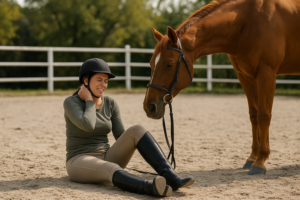
Injured While Horseback Riding? Know Your Legal Rights and Next Steps
Injured While Horseback Riding A relaxing day at the stables can turn into a life-altering event in seconds. Understanding your legal rights after a horseback

Ep. 188 | A Deep Dive into Common Accident Trauma
Join us in this informative episode of the Ramos Law Difference Makers Podcast, led by Dr. Hoven. As a trusted guide, Dr. Hoven delves into
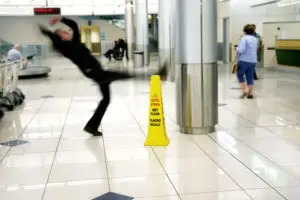
Slip and Fall Attorney for Retail Store Injuries
A slip and fall attorney could be a solid ally should you experience an injury as a result of negligence in a retail store.





